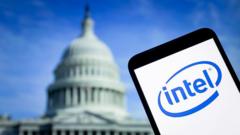Is Trump's Intel Deal Changing American Business Traditions?

Published: 2025-08-27 02:07:12 | Category: wales
Donald Trump's recent announcement about the US government acquiring a 10% stake in Intel marks a significant shift in the government's role in private industry, particularly in the semiconductor sector. This move has sparked debate over the implications of state involvement in business operations and could reshape the landscape of American capitalism.
Last updated: 21 October 2023 (BST)
Key Takeaways
- Trump's government stake in Intel is valued at approximately £9 billion.
- The acquisition is framed as a strategic move to bolster national security and domestic manufacturing.
- This action breaks with traditional conservative economic principles.
- Concerns arise over potential market inefficiencies and corruption due to government intervention.
- There is speculation regarding the establishment of a US sovereign wealth fund.
- Responses from both sides of the political spectrum highlight the contentious nature of the move.
The Context of Trump's Announcement
In a bold move, former President Donald Trump stated that the federal government would acquire a significant stake in Intel, a leading American semiconductor manufacturer. This announcement has raised eyebrows, not just for its economic implications but also for its ideological ramifications, as it diverges from the traditional conservative principles of limited government and free-market capitalism.
The Mechanics of the Deal
Trump's assertion that the US paid "zero" for its stake in Intel is somewhat misleading. The government converted unpaid construction grants tied to the 2023 Chips Act, aimed at enhancing domestic semiconductor manufacturing, into equity in Intel. This transaction allows the government to take an active role in the operation of a private sector company, which is unprecedented in recent American history.
National Security and Economic Strategy
Proponents of the deal argue that strengthening Intel is vital for national security, especially given the increasing global competition in the semiconductor industry. Trump has indicated that such government investments could serve as a safeguard against foreign dominance in critical technologies.
Commerce Secretary Howard Lutnick echoed this sentiment, suggesting that the US might consider similar investments in defence and munitions contractors. The rationale is that companies heavily reliant on federal contracts should reciprocate by aligning their interests with those of the American public.
Historical Precedents: Government Ownership in the Private Sector
While Trump's decision is unprecedented in the current political landscape, it is not without historical precedent. The US government previously took ownership stakes in major corporations, such as General Motors and Citigroup, during the 2008 financial crisis. These interventions were justified as emergency measures to prevent economic collapse, contrasting sharply with Trump's proactive approach, which appears more strategic than reactive.
Global Comparisons: State Involvement in Business
State ownership of private enterprises is not unusual when viewed through a global lens. Countries like China and Russia actively invest in and control significant portions of their domestic industries. Even in Europe, governments have historically supported key sectors deemed critical to national interest. This raises questions about the effectiveness and motivations behind such investments in the US context.
Criticism and Concerns
Trump's move has not gone without criticism, even from within conservative circles. Critics argue that government involvement in business could lead to market inefficiencies and corruption. Tad DeHaven, an economic policy analyst, cautioned that political considerations might overshadow sound economic decision-making, ultimately harming the very companies the government aims to support.
The Potential for Corruption
Concerns about corruption and cronyism are heightened when the government enters into business dealings. The potential for politicised investment decisions raises the spectre of favouritism and undermines the principles of fair competition. Critics warn that the drive to help companies that align with government interests could distort market dynamics.
Political Reactions: A Divided Response
Trump's announcement has ignited a mixed response among politicians. While some Republican figures have expressed unease, others have been more supportive. Notably, Senator Rand Paul has voiced concerns about the implications of government ownership in terms of advancing socialism. This sentiment resonates with traditional conservative values that champion limited government intervention in the economy.
Interestingly, even self-declared socialists like Bernie Sanders have found common ground with Trump, arguing that taxpayers deserve a fair return on their investment in companies benefiting from government grants.
The Broader Implications for US Economic Policy
This move could signal a shift towards a more interventionist economic policy, potentially laying the groundwork for a US sovereign wealth fund. Senior Trump economic adviser Kevin Hassett has suggested that this could be the first step towards such a fund, mirroring successful models used by other nations. However, this raises questions about regulation and oversight, particularly in a political climate marked by increasing populism.
Future Transactions on the Horizon
Hassett hinted at the likelihood of future transactions across various industries, suggesting that this approach could expand beyond semiconductors. If successful, it could redefine the parameters of government involvement in the private sector, reshaping the relationship between business and state in the US.
Conclusion: What Lies Ahead?
Trump's foray into state-managed capitalism through the Intel investment could have far-reaching consequences for the American economy. As the government takes a more active role in industry, the balance between public interest and market freedom may be tested. This development raises essential questions about the future of US economic policy and the potential for increased government intervention in the private sector.
As the landscape shifts, it remains to be seen how this model will evolve and what impact it will have on American businesses and taxpayers alike. Will the government’s stake in companies like Intel lead to innovation and growth, or will it entrench inefficiencies and corruption? Only time will tell. #Trump #Intel #USGovernmentInvestment
FAQs
What was Trump's announcement regarding Intel?
Trump announced that the US government would acquire a 10% stake in Intel, valued at around £9 billion, as part of a strategy to enhance national security and support domestic semiconductor manufacturing.
Why is Trump's move controversial?
The acquisition has sparked debate as it contradicts traditional conservative principles of limited government and raises concerns about potential market inefficiencies and corruption from government involvement in private businesses.
What are the historical precedents for government ownership in private companies?
The US government has previously taken stakes in companies like General Motors and Citigroup during the 2008 financial crisis as emergency measures to prevent economic collapse, contrasting with Trump's proactive strategy.
Could this lead to a US sovereign wealth fund?
There is speculation that Trump's approach to investing in companies could lay the groundwork for a US sovereign wealth fund, similar to those operated by other nations, although formal Congressional approval has not been sought.
How have politicians reacted to Trump's announcement?
The reactions have been mixed; while some Republicans express concerns about government ownership equating to socialism, others find common ground with Trump’s rationale, including figures from the left like Bernie Sanders.
What are the potential risks of government involvement in private industry?
Critics warn that government involvement could lead to politicised investment decisions, which may overshadow sound economic practices, creating opportunities for corruption and cronyism in business operations.



